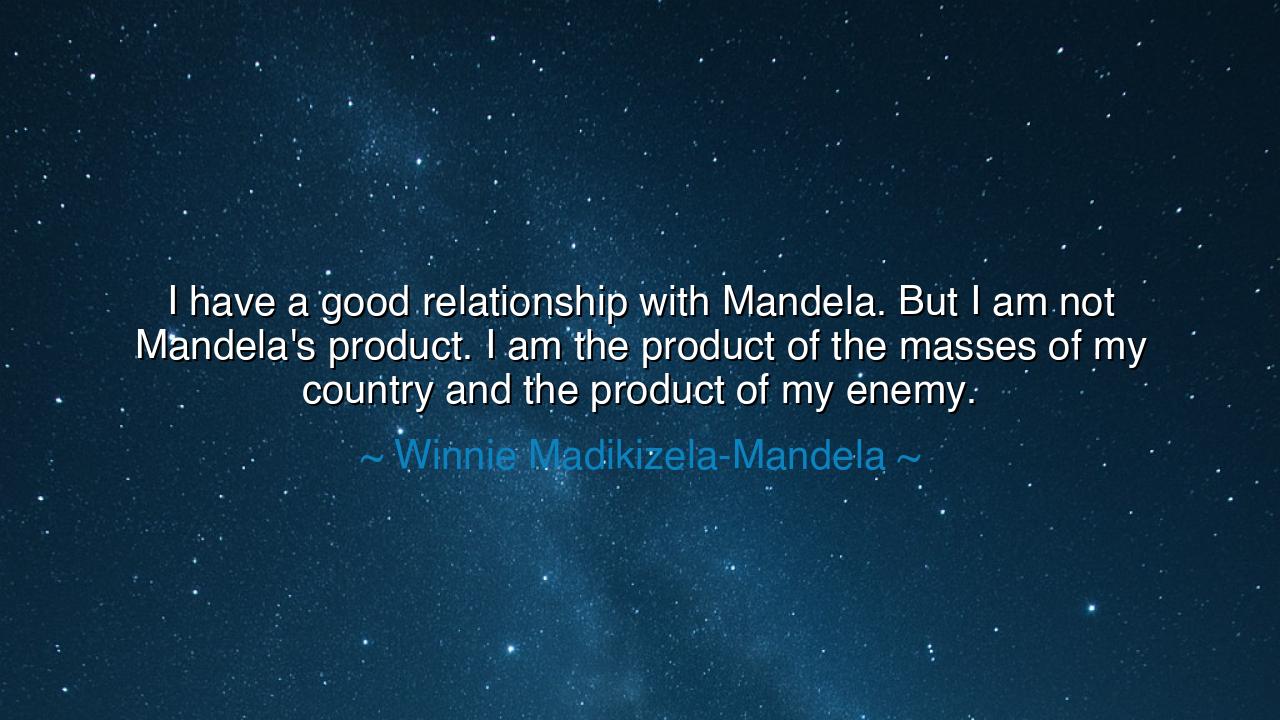
I have a good relationship with Mandela. But I am not Mandela's
I have a good relationship with Mandela. But I am not Mandela's product. I am the product of the masses of my country and the product of my enemy.






The warrior of justice, Winnie Madikizela-Mandela, once declared with unyielding strength: “I have a good relationship with Mandela. But I am not Mandela's product. I am the product of the masses of my country and the product of my enemy.” In these words she proclaims her independence of spirit, refusing to be overshadowed by the towering figure of her husband. Her relationship with Mandela was one of respect and love, yet her identity was forged not in his shadow, but in the fires of struggle and resistance.
For she names herself a child of the masses, born of their hopes, their sorrows, and their unbreakable will. The people’s cries for freedom, their blood and suffering under the yoke of apartheid, shaped her more deeply than any single man could. To be the product of the masses is to declare solidarity, to bind oneself not to one name, but to the millions who marched, fought, and endured.
And yet, with fearless honesty, she declares herself also the product of her enemy. For it was the cruelty of oppression, the violence of the state, and the merciless hand of injustice that carved her resolve and sharpened her defiance. Just as steel is hardened by fire, so her spirit was tempered by persecution. The enemy, intending to destroy her, instead became the hammer that fashioned her unyielding strength.
Her words are both heroic and prophetic, for they teach that identity is not merely inherited but forged. To be tied only to a leader is to risk dependence; to be born of the masses and even of the enemy is to embody resilience, to stand as a testament of survival and defiance. Winnie Madikizela-Mandela thus claimed her own place in history—not as a branch of another’s tree, but as a root deeply entwined with the soil of her people’s suffering and hope.
So let this wisdom endure: do not let others define you by the greatness of those around you, but by the trials you have endured and the people you have served. For true power is not borrowed from a companion, but earned in the crucible of struggle. And in the words of Winnie, we hear the eternal cry of the oppressed: we are not the products of one name, but of a people, and even of the enemies who tried to break us.






GDGold D.dragon
This quote is a striking reflection on the complexities of identity. By acknowledging that she is shaped by both her supporters and her enemies, Winnie Madikizela-Mandela challenges the idea that we are solely defined by positive influences. It reminds me of how we often define ourselves by who is ‘on our side,’ but never fully recognize the role that adversity and opposition play in our growth. How can we better embrace all the forces that shape us?
GDGold D.dragon
Winnie Madikizela-Mandela’s comment about being the product of both the masses and her enemy resonates deeply. It makes me think about how much our experiences, including hardships and struggles, shape us as individuals. How often do we fail to give enough weight to the people or systems that challenge us, even when they try to hold us back? Can we truly understand our potential without considering both sides of the equation?
CNChuyen Nguyen
Winnie Madikizela-Mandela’s words really emphasize how our identities are shaped by more than just those we admire or who support us. She points to the idea that even our enemies can contribute to our development, which is such an interesting perspective. I wonder, how often do we think about how adversity and opposition contribute to our strength and resilience? Is it possible to truly understand ourselves without acknowledging the influence of both sides?
CCca cha
This quote by Winnie Madikizela-Mandela is so powerful. It speaks to the complexity of identity and the influence of both allies and adversaries. Her statement that she is not just a product of Mandela, but also of the masses and her enemies, highlights how personal growth and strength come from a variety of sources, even those who oppose you. How often do we fail to recognize the role challenges and opposition play in shaping who we become?